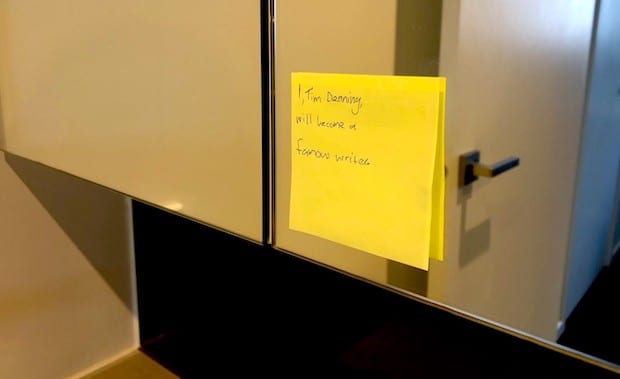Success Advice
Your PHD / MBA Doesn’t Impress Me

That piece of paper you get after slaving away for years and going into huge amounts of debt doesn’t impress me. That acronym known as your education with three letters after your name doesn’t impress me.
Many countries like Australia, where I live, allow us to go on some deferred government payment system to achieve something we’re told we need.
I don’t hate university education; I just hate what it can do to people, and the entitlement and superiority it often creates. I hate when it changes people and makes them incongruent with who they really are. I hate when the piece of paper comes in the mail at the end of it all and nothing has changed. The broken dreams and a sense that we’re not enough continues on.
Think carefully about who and why you’re being told to get that Ph.D. / MBA because it doesn’t impress anyone, let alone me.
I’d rather you have time
Time to have fun and enjoy life. We’re here for a blink of an eye in the grand scheme of things. Who wants to spend time studying something, buried in books, rather than getting real world experience? Not me. If you want to learn a new skill, then go and do it.
The time you are wasting on getting a piece of paper to impress other people is killing your time. You could be using that time to do something you are passionate about and become a master at it, at the same time. You could do something that utilizes your passion and simultaneously inspires others.
Inspiring people with your gifts will light you up a lot more than any accreditation ever will. Spend your time wisely – you can’t get it back. You can’t cash in your qualification for all of those lost hours when you start to have regrets.
I’d rather you had money
Education costs a bucket load of cashola. Those thousands of dollars could be used to start a business you love or to travel to places you’ve always wanted to go to.
Those same dollars could be spent on self-development where you’ll learn who you are and why you’re here. You’ll learn the meaning of life. The meaning of life is not to work your butt off until everyone around you forgets who you are.
“Finding out who you are is the best education you can get”
Becoming a student of life is far more important. How do you do that? Take consistent action towards something you care about.
Having resources like money at your disposal can buy you time. Time buys you hours towards mastering your passion. It’s all linked. The thing that lights you up is what you need to educate yourself on.
If that’s a three-letter education, then chase it all you want and throw this article in the bin. If you’re honest with yourself and that’s not the case, run from your course as fast as you can. Don’t look back and forget about what your colleagues think.
I’d rather you were happy (not depressed)
I meet many academics that are not happy because they think that graduating will give them some Holy Grail.
“The Holy Grail is you. You’re the trophy and you’re better than any accreditation”
I hereby accredit you to be happy and live the life of your dreams. Being happy is much better than being depressed because you’re stressed from too much study.
Your number one priority should be your happiness. Seeing someone happy is what impresses me because it’s so hard to find in this crazy, messed up world.
Happiness should become your new holy grail and you should spend time studying that if you feel you haven’t found it. Happiness is found in the simple things in life. Happiness starts with you first. You must give yourself permission to be happy and no outside force will do that for you. Not even that university degree you think you need to be part of society.
I’d rather you were less stressed
Stress makes you age quickly and it takes away your willpower to inspire people and get out of your comfort zone. Stress is that disease in your body that is the catalyst for everything that is making you feel messed up. The good news is that stress can be worked through once it’s identified.
What impresses me is meeting someone who is calm and relaxed like a Buddhist monk. Someone who is full of wisdom and is not always thinking about the next goal or big event.
I’d rather you used creativity
People who are present and calm can change the world. The reason is that they have the headspace needed to be creative.
What they don’t teach you at university is how to be creative. The crux of creativity is being able to dream up something that no one else can imagine. It’s using your mind to think of a problem and then solve it. Creativity is having faith in the outcome even though it doesn’t exist in any physical form yet.
Creativity is like the heart of any entrepreneur. Creativity mixed with passion will change the world. That’s what impresses me, not your education status.
I’d rather you followed your dream
Not following your dream because you are trying to fit in with someone else’s standards is a real tragedy. Think carefully: who told you that you need a Ph.D. / MBA? What made you think you need one? If it was because you had a passion for education, then that’s okay sailor.
If it’s for some other reason (it usually is) then Mr. Trump, we have a problem. People that follow their dream are impressive. They do what 99% of people don’t seem to do. They’ve put it all on the line for that one thing that makes sense and lights them up.
When you meet someone who follows their dream, they have a different energy about them. They’re confident – not because they’re cocky – they’re confident because they know what they are pursuing in life. Certainty is confidence which leads to power. That’s what impresses me.
I’d rather you served others
Instead of chasing an education status that fulfills your own selfish desires, I’d rather you served others. I’d rather you had an education in the power of serving others and helping people. It feels amazing and it’s the sort of feeling that most MBA’s / Ph.D.’s will never give you.
That doesn’t mean we forget about ourselves; it just means we get a two for one combo. We serve others and we get the fulfillment to keep all to ourselves.
It’s tricky to explain unless you’ve experienced it. How you can affect other people’s lives is the best education for your own life.
“Your selfish desires are met through the desires of those you serve”
Finding a meaning for your life is buried deep within others. No one ever tells you that. We keep digging for treasure in the form of education thinking that the more we focus on ourselves, the more we will achieve our goals. This way of thinking is completely the opposite of the truth.
I’d rather you changed the world
If you want to impress the pants off me, then change the world. Do what so many are not prepared to do. Have a vision so large that people laugh in your face at your ridiculous ideas. Defy the odds. Go through hell and back. Spend your life learning how to work with people.
Become a leader. Help people change their lives. Improve the way we live on Earth and chase your dreams to the end of the universe. If you do that, then you’ll impress me. Your Ph.D. / MBA will never do that. Think about that thought long and hard.
If you want to increase your productivity and learn some more valuable life hacks, then join my private mailing list on timdenning.net
Life
Why Moving to a New City Can Change Your Mindset
Discover how moving to a new city boosts neuroplasticity, builds resilience, and reshapes your mindset

Relocation is always a challenge. Rebuilding and restarting your life requires you to step outside of your comfort zone. (more…)
Business
DIY vs Delegate: The Real Reason You’re Burned Out
Doing everything yourself feels productive until it quietly becomes the reason your business can’t scale.

You know that moment when your brain has 37 tabs open and every tab is screaming “urgent”? That’s the DIY life when it starts to crack. (more…)
Change Your Mindset
The Hidden Reason You Can’t Stay Consistent
If motivation keeps failing you, the real issue isn’t discipline. It’s the identity shaping your habits and long-term success.

Success often looks like a time-management problem. You buy a planner, set reminders, and hope that next week will be different. For a few days, it works. Then stress hits, motivation drops, and old patterns return. (more…)
Business
9 Modern Workplace Solutions That Instantly Boost Productivity
Modern workplace solutions, smart tech, and flexible systems help teams work faster, stay focused, and drive higher productivity without burnout.

Contemporary workplaces continue to adapt to new demands and expectations. Employees seek efficiency, comfort, and flexibility in their work environments. Modern workplace solutions address these needs through technology, thoughtful design, and supportive practices. (more…)
-

 Business4 weeks ago
Business4 weeks agoEntrepreneur’s Guide to Pay Stubs: Why Freelancers and Small Business Owners Need a Smart Generator
-

 Business3 weeks ago
Business3 weeks agoThe Salary Shift Giving UK Employers An Unexpected Edge
-

 Scale Your Business4 weeks ago
Scale Your Business4 weeks ago5 Real Ways to Grow Your User Base Fast
-

 Business4 weeks ago
Business4 weeks agoThe Simple Security Stack Every Online Business Needs
-

 Finances4 weeks ago
Finances4 weeks agoWhy Financial Stress Is One of the Biggest Barriers to Personal Growth
-

 Business3 weeks ago
Business3 weeks agoWhy Entrepreneurs Should Care About AI Automation Testing
-

 Business3 weeks ago
Business3 weeks agoWhy Smart FMCG Entrepreneurs Outsource What They Can’t Automate
-

 Business2 weeks ago
Business2 weeks agoWhat Every Business Owner Should Know Before Investing in API Integration






















